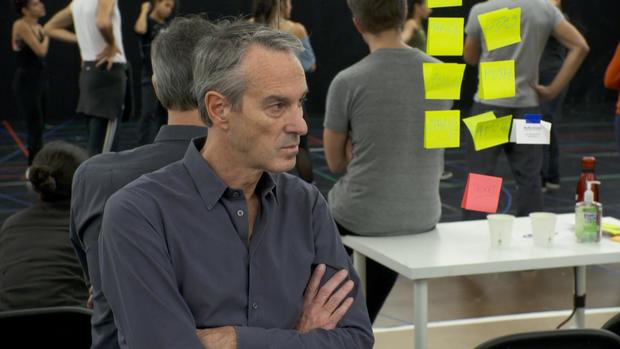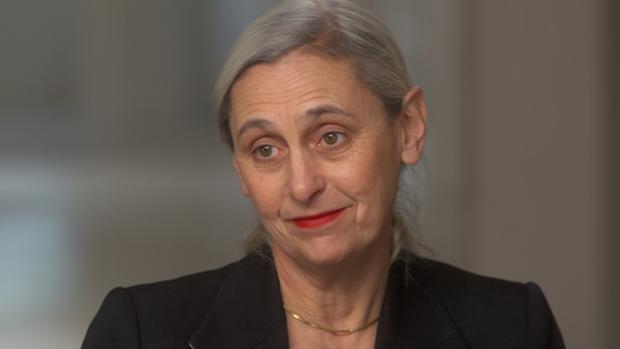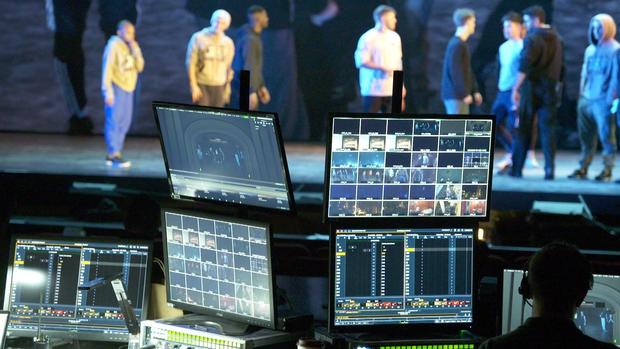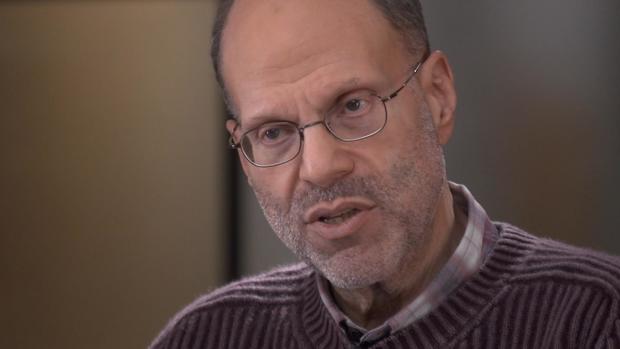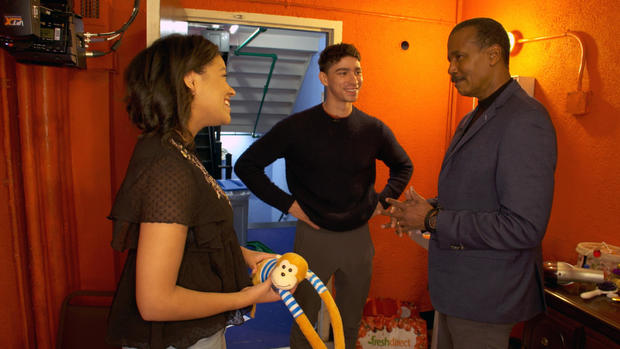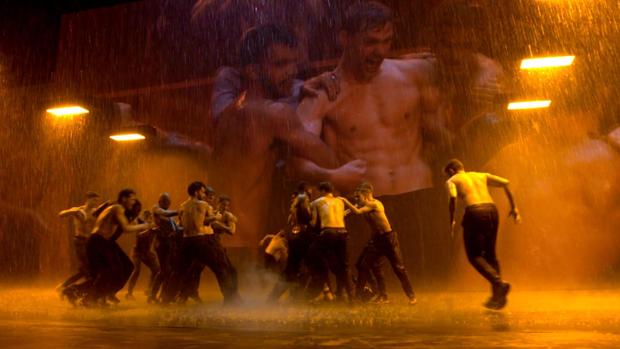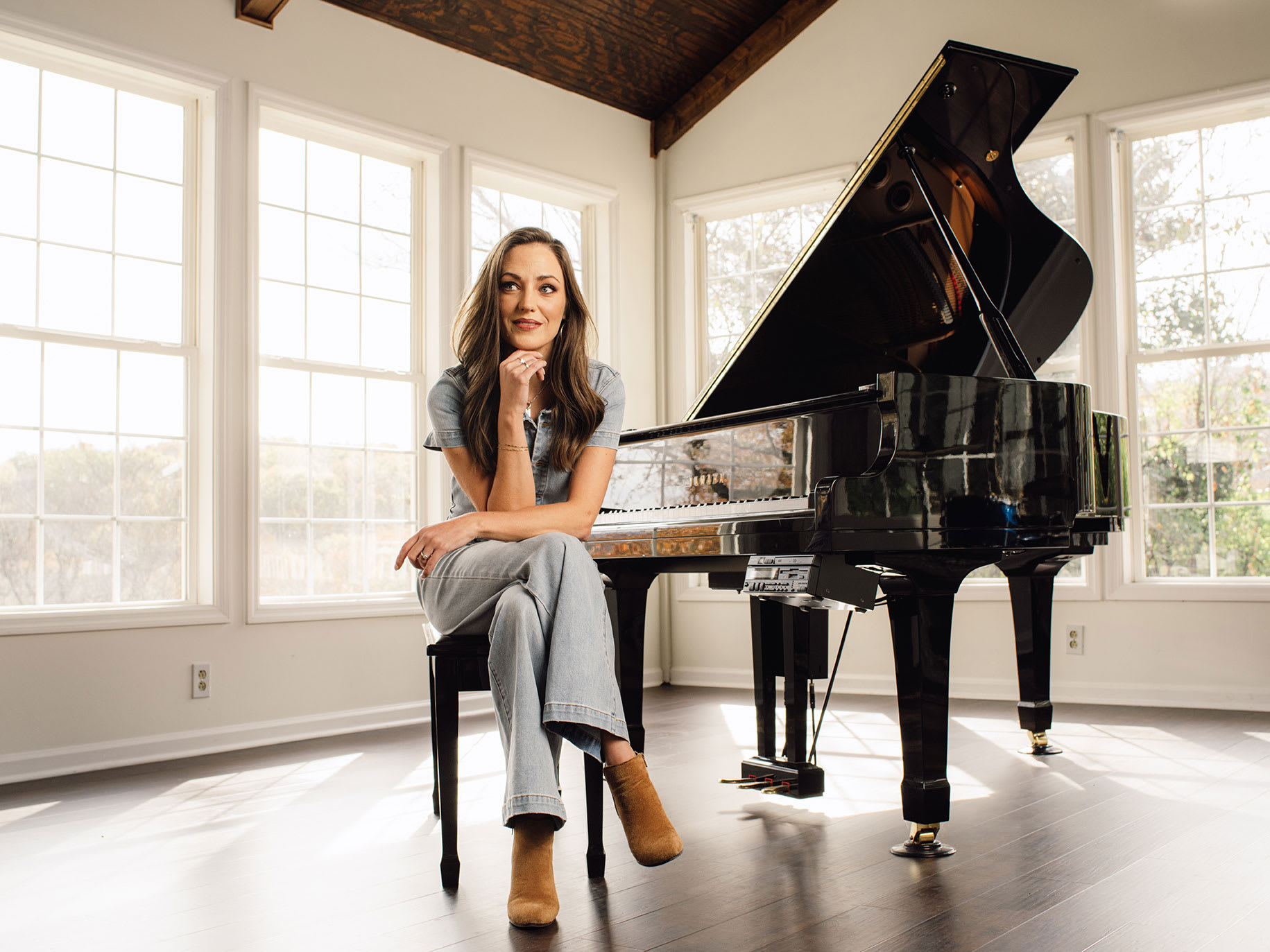"West Side Story": Behind the scenes of the 2020 revival
When the musical "West Side Story" opened on Broadway in 1957, it caused a sensation with the innovative fusion of dance, music and theater - a reimagining of Shakespeare's "Romeo and Juliet." Tony and Maria are the star-crossed lovers. Rival New York City street gangs, the Jets and the Sharks take the roles of the Montagues and the Capulets. In four days, a new team of creative artists will open the most radical revisioning of the iconic musical ever to hit Broadway. We were given unprecedented, behind-the-scenes access to see the making of this more than $15 million production. There's no intermission. Iit's stripped down, fast and gritty - a "'West Side Story' for the 21st century."
- "West Side Story" lyrics still embarrass Sondheim
- Why "I Feel Pretty" is not in the "West Side Story" Revival
We started rolling our cameras early in October in a mid-Manhattan dance studio. The first notes of Leonard Bernstein's music and Stephen Sondheim's lyrics stirred treasured memories.
But Ivo van Hove, a Tony Award-winning director, known for his cutting-edge productions, promised something new: a more raw and raging "West Side Story."
It's Van Hove's first Broadway musical. Updating this American masterpiece was his idea. The Belgian director says the story is universal.
"Jumping into this American classic," correspondent Bill Whitaker said in a conversation with van Hove. "There must be things about this that just scare you?
Everything scares me about this," van Hove said with a laugh. "It's a huge challenge, because everything has to be on the highest level, the singing, the dancing, and the acting. And of course everybody has an expectation."
The songs and Arthur Laurents' story are the same, but the dancing is all new.
Van Hove tapped choreographer Anne Teresa De Keersmaeker, his friend and fellow Belgian, to design more contemporary, street influenced movement.
"This is your first Broadway production," Whitaker said to De Keersmaeker. "This is a different animal."
"Would you call it an animal? What kind of animal? A lion? a serpent? A dragon? Maybe a dragon." De Keersmaeker responded while laughing. "It's huge. It's a lot of people. It's-- a lot at stake. And it's-- it's teamwork. You know, with clear leaders being Ivo and I."
Their young cast reflects America today. In this version the Jets are not all white. And the Sharks are not just Puerto Ricans. They're recent Latino immigrants. Thirty-three of the 50 cast members are making their Broadway debuts.
"It's not easy to sing these songs. You have to dance at the same time,"van Hove said. "Also... you have to be able to act. So that's a very difficult thing when you're very young and ha-- and when you don't have a lot of experience.
Van Hove is animated, decisive; De Keersmaeker calls herself a patient collaborator.
"I'm not a general. I'm not like, 'Cha, cha, cha, chack.'" De Keersmaeker said. "We start to shape it together with the dancers."
Her style is vastly different from the original, balletic dancing of director/choreographer Jerome Robbins, immortalized in the 1961 movie.
"So how do you change something like America, the way she throws the dress around?" Whitaker asked De Keersmaeker.
"Those dresses are very beautiful," De Keersmaeker said. "They really enlarge the movement, but that's not the way people-- young people dance these days."
So that's out?
"That's out," De Keersmaeker said.
That's not the only big change.
"No snapping of the fingers," van Hove said. "Because it's not in the score. It's an invention of Jerome Robbins and we should respect that, you know? You can be inspired by other people but not stealing from them, I think."
This was their vision. After five weeks in the rehearsal hall, the last run through before moving to the theater. Two days later, on November 18, the production went uptown to the Broadway Theatre.
The scenery is an enormous, black wall that opens up to reveal two hidden sets. Central to van Hove's reimagining: cameras everywhere. Twenty-five of them projecting images onto the wall designed to intensify the action. It's video on a scale Broadway has never seen.
De Keersmaeker had to scale up her dancers' movements to fit the bigger space and giant images.
"So when the audience walks in, that's what they're going to see?" Whitaker asked Scott Rudin, the money and power behind this production.
"That's it. That's-- that's 'West Side Story,'" Rudin said. "It's a black box, fully exposed, guts and all it's not "West Side Story" of 1957. It's just not that."
So is the veteran producer concerned at all that that video image will overwhelm your actors on stage?
"I think we're managing our way into it," Rudin said. "There are places where I think it still does slightly overwhelm, or kind of dwarf the actors, and some places where it's incredibly exciting that it's there. But it's been a fascinating toolkit to play with."
Isaac Powell and Shereen Pimentel play the doomed lovers, Tony and Maria. They took us to what they call a secret set. Four flights up above the stage, out of sight of the audience, in what was once a dressing room, now is Maria's bedroom.
"There's a camera set up in the bedroom," Pimentel said.
"So in the play," Whitaker asked, "you will be running up and down the stairs to come to your room?"
"Yep," Pimentel said.
So is this a theater, or a movie set?
"Why does it have to be either?" Powell said. "It's both."
"It's happening in real time," Powell said.
Seamlessly?
"Sometimes. Of course there are bound to be bumps," Powell said. "And kinks that need to be ironed out."
We saw some of those kinks. The first time in the theater van Hove rehearsed the bedroom scene when Maria learns Tony has killed her brother, it was like directing a movie. He blocked it with the actors and cameras, then went down to the theatre to watch it unfold on the video wall.
"We were here one day when you were rehearsing the bedroom scene upstairs," Whitaker said to van Hove later. "The camera was out of focus, the actors were out of position, you were getting angry. You at one point said, 'Everything is wrong. So much of this is wrong.' Did you ever have any questions through that, about the use of the video like that?"
"No, no, no, no," van Hove said. "The challenges were high. And of course you know that it will be a journey. You know, it took us a while to bring all the elements, you know, in a perfect balance. So, no, it's a normal process, in this case a very intense one."
Something else they had to fix: the rain. A deluge that soaks the actors and sometimes musicians in the orchestra pit. The calm in the middle of the storm: Ivo van Hove.
"You take notes on everything," Whitaker said to van Hove. "The next day you go up and you have production meetings with the crew and you go work with the actors. I mean, this seems like a grueling process."
"I love that," van Hove said. "I feel like a fish in the ocean, you know? And-- and the ocean is a dangerous place to be sometimes, you know, but also great place to be. I love the sometimes violent but always the high energy of a rehearsal process."
As the show evolved, we saw as much drama offstage as on. Two Latin dance consultants were brought in to add more authenticity and Broadway flair to De Keersmaeker's choreography.
"I don't like when they start to fuzzle with your material," De Keersmaeker said.
"Is that what they were doing?" Whitaker asked. "Fuzzling with your material?"
"Well, there is a certain codified language in Broadway," De Keersmaeker said. "You know, how a number has to end, how you have to build tension, you know? And it's true. I don't have so much experience about that. I think finally it turned out well. But I would be lying if I say that it went, like, smoothly like this, you know?"
It seemed the show was snake bit. Isaac Powell, Tony, injured his knee and had to take a month off. That delayed opening night by two weeks. Veteran actor Ben Cook, who played Riff, the leader of the Jets, dislocated his shoulder and had to leave the show six weeks before opening, giving 22-year-old castmate, Dharon Jones, a newcomer to Broadway, the break of a lifetime.
Then protests erupted over Amar Ramasar, a dancer with the New York City Ballet who plays the leader of the Sharks. He's been named in a civil suit alleging he participated in an exchange of explicit pictures of female dancers, which he contests. Ramasar was initially fired by the New York City Ballet.
"The arbitrator found that there had been no firing offense," producer Scott Rudin said. "He got reinstated. I don't excuse it. I think what he did was really stupid."
"I mean am I supposed to replace him in the show? I'm not gonna do that," Rudin said.
After 19 weeks, the performances have been polished, the video fine-tuned, the dancing distinct. They're ready, after all the blood, sweat and tears.
"It's a bit like a battlefield. You know? It's a battlefield," De Keersmaeker said. "And you have to behave like a general."
De Keersmaeker told us originally that she is not a general.
"Yeah. I know. I'm not a general," De Keersmaeker said. "But I am a dancer. So, I mean, I'm flexible. I've patience. In Italian, they say, 'Hai voluto la bicicletta.' They say you wanted the bicycle. So now you have to-- you have to peddle. You know? I made a choice of doing this. I knew it was not gonna be easy. So hai voluto la bicicletta. Yeah, now peddle."
And now they ride into the uncertainty of opening night.
"I was at the birth of this thing," van Hove said. "I know exactly what I wanted it to be. the whole vision has been realized. And I'm really happy with that."
"Am I always successful? No. Will this be successful? We'll see," van Hove continued. "It's up to you, you know, to judge that. It's not up to me. I did everything possible with my team."
Produced by Ruth Streeter and Kaylee Tully. Edited by Sean Kelly. Broadcast associate, Emilio Almonte.

